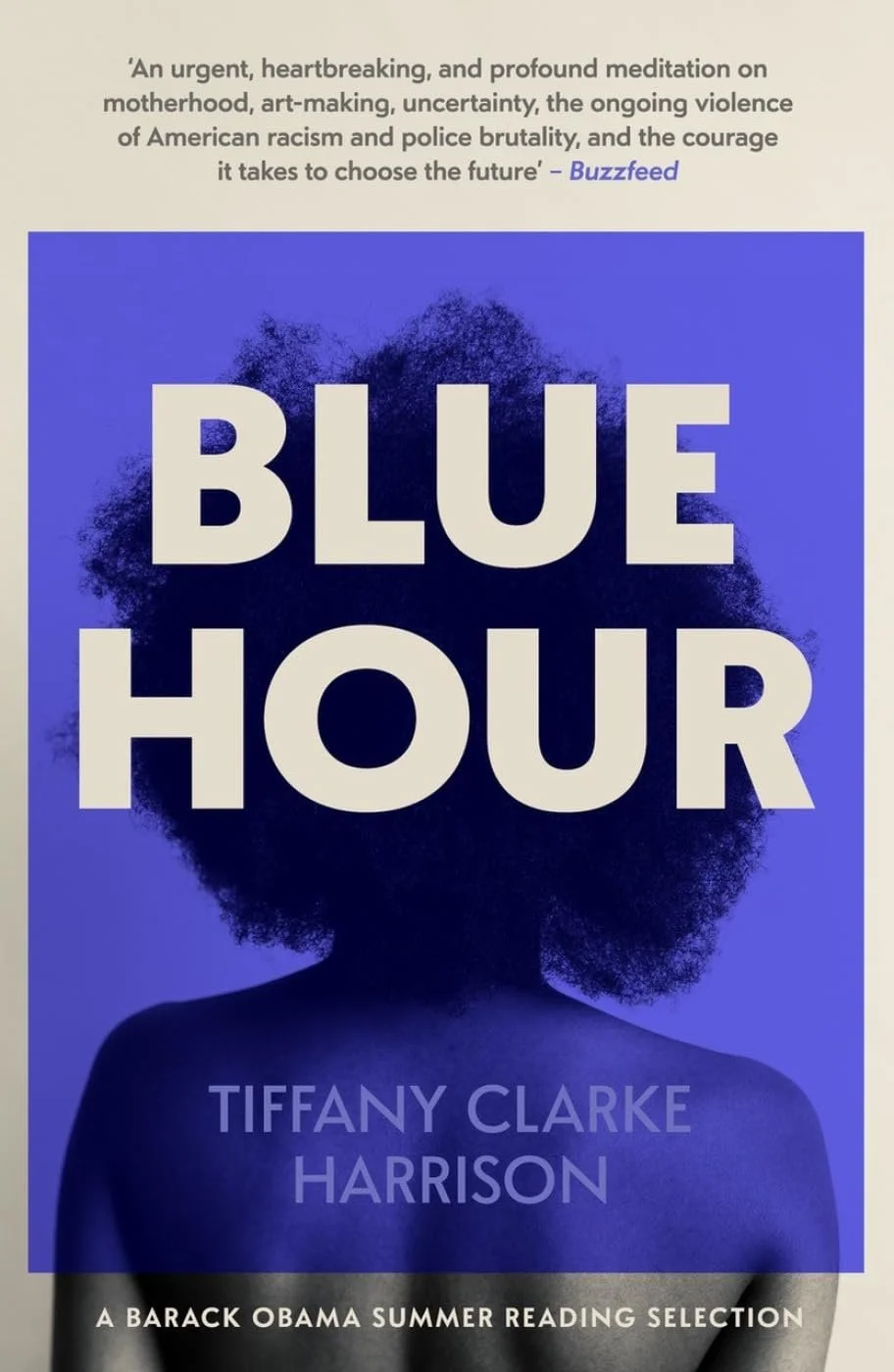Blue Hour by Tiffany Clarke Harrison
“Recited vows as somewhat strangers, then family. I could hardly bring my tongue to curl around the word family, project it. So why do I consider it now? Why do I consider my parents and sisters? Our baby, dead before birth? Now as the world nears down on Black bodies (another man killed), and I am tired. Now that I’ve had enough.”
‘Blue Hour’ refers to the time of day when the sky is typically a deep blue hue. The narrator in Tiffany Clarke Harrison’s debut novel, Blue Hour (2023), is a photographer, and she spends a brief moment during this hour with one of her photography students, a young teen named Noah. It’s a poignant experience that denotes a transition for the narrator – a time before and a time after – when everything changes. These transitions feature heavily throughout the book.
“The world is blue and blurry, wobbling it seems… I look at the sky. Of course – blue hour. He asks what that means. Light is evenly diffused and appears blue, I say. Happens just after sunset or sunrise. He says it’s perfect.”
Published in 20234 to acclaim, Blue Hour is set in New York, post the murder of George Floyd, a Black American man, at the hands of police. Our narrator recounts a reckoning in her life, speaking as though to her Jewish husband, Asher, offering an explanation of the ways she has tried to survive both personal and global trauma, and how this has directly and indirectly impacted their relationship. The book opens with our narrator remembering their first meeting, sharing her background – “Black, Haitian, Japanese” – and the ensuing whirlwind romance.
“You always say you noticed my hair first. You say it billowed and rolled like a cloud down my back, and then you coat my neck with kisses.”
For a short book (only 153 pages), Harrison weaves in some hefty themes. Our narrator and her husband experience two devastating miscarriages, and she is forced to grapple with her ideas of what being a mother means to her and women like her, to be a parent to a Black body, in a world that seems only to want to cause them harm. Noah becomes a victim of police brutality after she cancels her photography workshop to attend a fertility clinic. He becomes hospitalised, and she visits him regularly, observing his mother and her care.
“When I arrive at the hospital, Noah’s mother is there. I stand in the hall and watch her. She is reading from a comic book… She makes funny sounds, changes her voice for the different characters, laughs. She stops reading to grip his shin beneath the sheet and whisper before standing to kiss her son on the mouth, to share his breath.
This is motherhood.”
Having lost her parents and sister in a tragic car accident when she was in her late teens, our narrator struggles not to feel accountable for the tragedies that seem to unfold as a result of her actions. She is caught between acknowledging and accepting her feelings and fears, and denying them. Through working with a therapist and starting a new creative project – a documentary interviewing mothers of Black people who have died at the hands of police brutality – she attempts to reconcile these parts of herself and find a deeper understanding of these experiences. In the midst of this, she discovers she is pregnant and must once again reconsider what motherhood, love, forgiveness and care can and might look like in her life:
“We hold our breath. We hold our breath. All the way to the first, second and third sonograms; all the way through sixteen weeks, we hold our breath.”
Blue Hour doesn’t offer any easy answers. There are no linear pathways through individual and collective pain, but Harrison does offer a reminder that love, creativity, our relationships and community can be the guiding ropes to help pull us through.
Emotional, cautionary and intimate, Blue Hour speaks strongly to our current times in more ways than one.
“‘Or the more you multiply. Love multiplies, it doesn’t deplete.’
‘It absolutely depletes.’
‘It doesn’t have to.’”
Elaine Chennatt is a writer, educator and psychology student currently residing in nipaluna. She has a special interest in bibliotherapy (how we use literature to make sense of our lives) and is endlessly curious about the creative philosophies of others. She lives with her husband and two bossy dachshunds on the not-so-sunny side of the river (IYKYK). Find her online at wordswithelaine.com.
